Cities As A Lab: Designing The Innovation Economy demonstrates How Design Can Foster Innovative Approaches

Cities as a Lab: Designing the Innovation Economy demonstrates how design can foster innovative approaches to the changing needs of American cities. The world is increasingly urbanizing and cities and their wider metropolitan areas are asserting themselves as a fundamental unit of the global economy. Cities can thrive by building transformational places that incubate creativity and adapt to future challenges and opportunities. Cities as a Lab explores the design and policy choices now creating the great places of the future: urban design interventions, visionary planning efforts, and public-private partnerships. The fabric of the city, with its people, buildings, commerce, and transportation networks, promotes relationship formation, business creation, and game-changing ideas.
More Posts from Dotmpotter and Others

Check in: The Tokyo hotel where guests can curl up with 1,700 good books
Book and Bed, a new Tokyo hotel, has created the sort of space that is impossible to leave. It is a cheap and cheerful dorm with a difference: guests’ bunk beds are hidden behind library shelves filled with hundreds of books in Japanese and English. | Read more

This is just great.
Facebook UK made £105M in 2014, paid £35M in bonuses, and will pay £4,327 in tax

Which is a notable improvement on its tax bill for 2013, which was £0 on earnings of £223m.
The company says it made an accounting loss of £28.5m in the UK for 2014. Facebook says that it “compliant with UK tax law” and adds that its employees usually choose to pay tax on their income rather than availing themselves of the kinds of tax dodges Facebook itself uses. Meanwhile, UK-based companies pay tax, as do their employees, meaning they have less income from which to return dividends to their investors, making UK-based business less profitable and less attractive.
The UK Tory chancellor, George Osborne, has announced swingeing cuts to tax credits for the UK’s working poor, who are at record levels, with many children living in food poverty, because the country allegedly can’t afford to top up the accounts of working people who are literally starving.
George Osborne has repeatedly cut corporate tax rates.
Read the rest


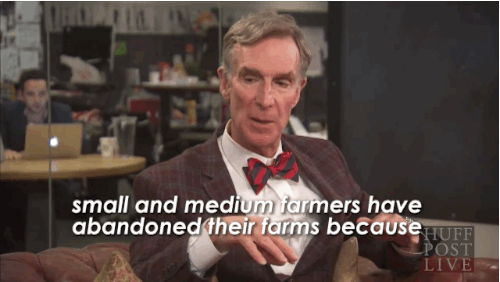

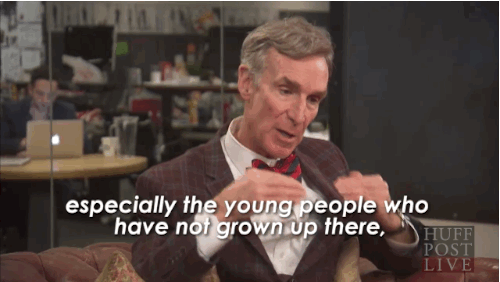

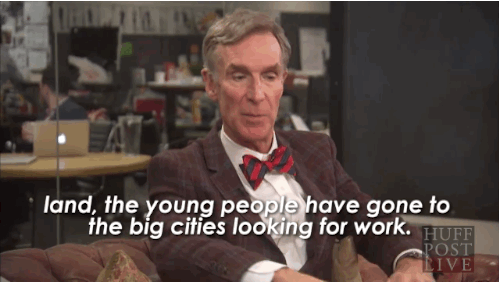
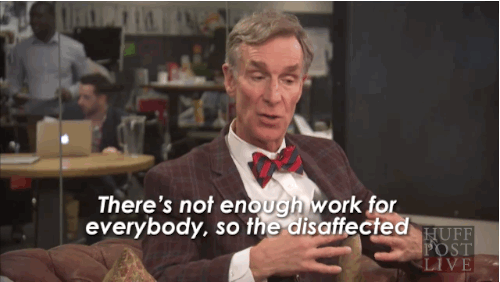
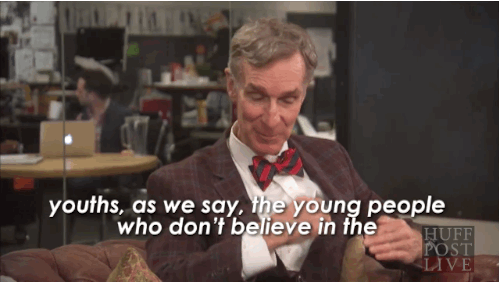
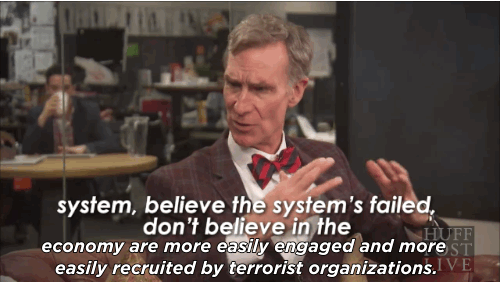
Bill Nye Explains The Connection Between Climate Change And Terrorism In Paris
President Obama made headlines Monday when he said during his remarks at COP21 that the climate change conference taking place in Paris is an “act of defiance” against terrorists who attacked the city earlier this month. Later on the same day, Bill Nye took that link a step further, explaining to HuffPost Live that the brutality in Paris was “a result of climate change.”
“This is just the start of things.”
That is the course that world leaders set when they met at the United Nations in New York on September 25 to adopt the Sustainable Development Goals (SDGs). The 17 goals range from ending poverty and improving health to protecting the planet’s biosphere and providing energy for all. They emerged from the largest summit in the UN’s history, the “Rio+20” conference in 2012, followed by the largest consultation the UN has ever undertaken.
We need your help to sustain our not-for-profit mission: ensuring that readers around the world have equal access to ideas and analysis from the world’s leading thinkers.
Unlike their predecessor, the Millennium Development Goals, which focused almost exclusively on developing countries, the new global goals are universal and apply to all countries equally. Their adoption indicates widespread acceptance of the fact that all countries share responsibility for the long-term stability of Earth’s natural cycles, on which the planet’s ability to support us depends.
Johan Rockstrom goes all in on poverty reduction and climate change.

Turns out, in addition to leaving our mark on surfaces, we’re also emitting a bacterial signature into the air—what scientists call a “microbial cloud.” And according to a new study conducted by the Biology and the Built Environment Center at the University of Oregon, this invisible aura is so specific that it can be used to distinguish between individual people.
Our Bodies, Our Microbial Clouds
[Graphic: Viputheshwar Sitaraman/Draw Science]



Researchers at MIT have developed a new method for harnessing energy generated by very small bending motions, which could be capable of harvesting power from a broader range of natural human activities such as walking and exercising.
Yale Environment 360: New Device Harvests Energy From Walking and Exercising, Researchers Say
-
 da-science reblogged this · 9 years ago
da-science reblogged this · 9 years ago -
 dotmpotter reblogged this · 9 years ago
dotmpotter reblogged this · 9 years ago -
 purns liked this · 11 years ago
purns liked this · 11 years ago -
 dethtron5000 reblogged this · 11 years ago
dethtron5000 reblogged this · 11 years ago -
 jenifferheemann-blog liked this · 11 years ago
jenifferheemann-blog liked this · 11 years ago -
 sitedareforma liked this · 11 years ago
sitedareforma liked this · 11 years ago -
 architryst reblogged this · 11 years ago
architryst reblogged this · 11 years ago -
 architryst liked this · 11 years ago
architryst liked this · 11 years ago -
 meantimebetweenfailure liked this · 11 years ago
meantimebetweenfailure liked this · 11 years ago -
 urban-ecology-blog reblogged this · 11 years ago
urban-ecology-blog reblogged this · 11 years ago -
 yh-dolores liked this · 11 years ago
yh-dolores liked this · 11 years ago -
 ben-leeinspire-blog reblogged this · 11 years ago
ben-leeinspire-blog reblogged this · 11 years ago -
 alexstaufer reblogged this · 11 years ago
alexstaufer reblogged this · 11 years ago -
 looking4affinities-blog reblogged this · 11 years ago
looking4affinities-blog reblogged this · 11 years ago -
 rasmalaiplease liked this · 11 years ago
rasmalaiplease liked this · 11 years ago -
 senorspielbergo liked this · 11 years ago
senorspielbergo liked this · 11 years ago -
 theamericanconservative liked this · 11 years ago
theamericanconservative liked this · 11 years ago -
 glenwoodj reblogged this · 11 years ago
glenwoodj reblogged this · 11 years ago -
 glenwoodj liked this · 11 years ago
glenwoodj liked this · 11 years ago -
 gentlyriseandfall liked this · 11 years ago
gentlyriseandfall liked this · 11 years ago -
 lndrbrntt liked this · 11 years ago
lndrbrntt liked this · 11 years ago -
 rumibaby liked this · 11 years ago
rumibaby liked this · 11 years ago -
 pacific-wisdom reblogged this · 11 years ago
pacific-wisdom reblogged this · 11 years ago -
 pacific-wisdom liked this · 11 years ago
pacific-wisdom liked this · 11 years ago -
 contemplatingchicken liked this · 11 years ago
contemplatingchicken liked this · 11 years ago -
 discjocker liked this · 11 years ago
discjocker liked this · 11 years ago -
 thatiswhatwedo reblogged this · 11 years ago
thatiswhatwedo reblogged this · 11 years ago -
 foreverramazing-blog liked this · 11 years ago
foreverramazing-blog liked this · 11 years ago -
 itsliisaa liked this · 11 years ago
itsliisaa liked this · 11 years ago -
 pretty-problematic reblogged this · 11 years ago
pretty-problematic reblogged this · 11 years ago -
 giovanemontalbuccio liked this · 11 years ago
giovanemontalbuccio liked this · 11 years ago -
 actlikesummerwalklikerain liked this · 11 years ago
actlikesummerwalklikerain liked this · 11 years ago -
 carlosrevolver liked this · 11 years ago
carlosrevolver liked this · 11 years ago -
 matrafulera liked this · 11 years ago
matrafulera liked this · 11 years ago -
 chagota liked this · 11 years ago
chagota liked this · 11 years ago -
 lelolxi reblogged this · 11 years ago
lelolxi reblogged this · 11 years ago -
 336bc liked this · 11 years ago
336bc liked this · 11 years ago -
 isoldesmusings reblogged this · 11 years ago
isoldesmusings reblogged this · 11 years ago -
 feed-well liked this · 11 years ago
feed-well liked this · 11 years ago -
 isoldesmusings liked this · 11 years ago
isoldesmusings liked this · 11 years ago